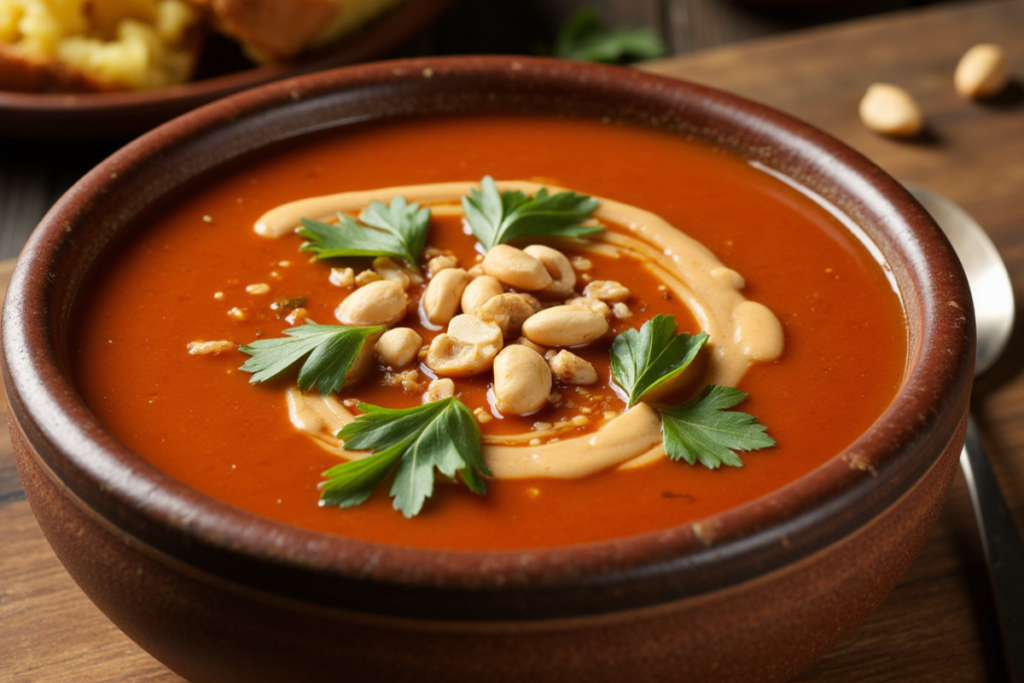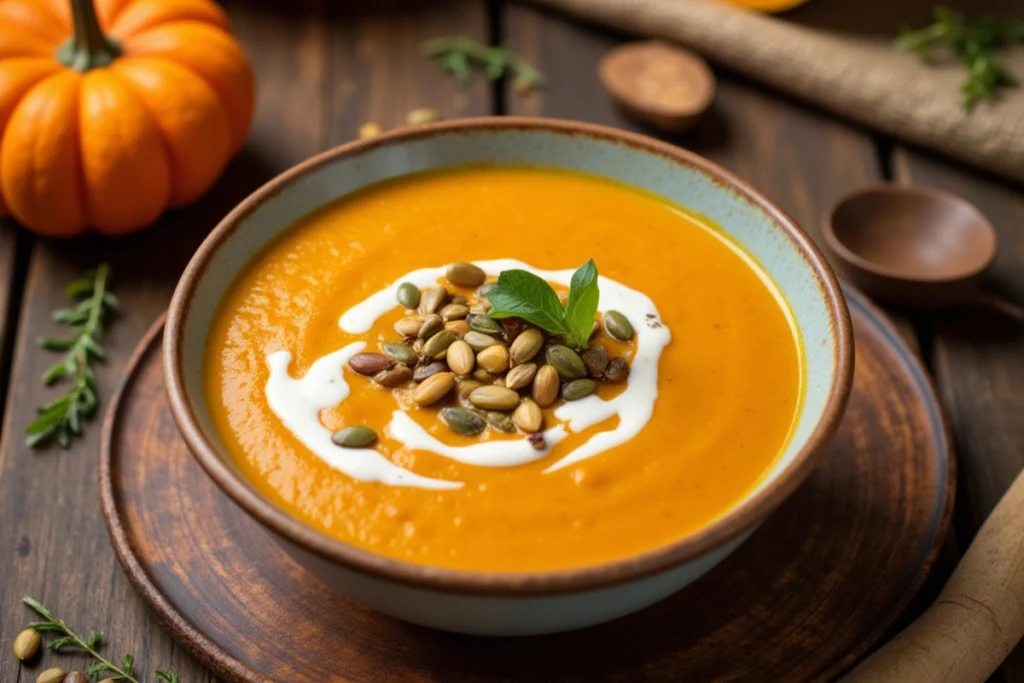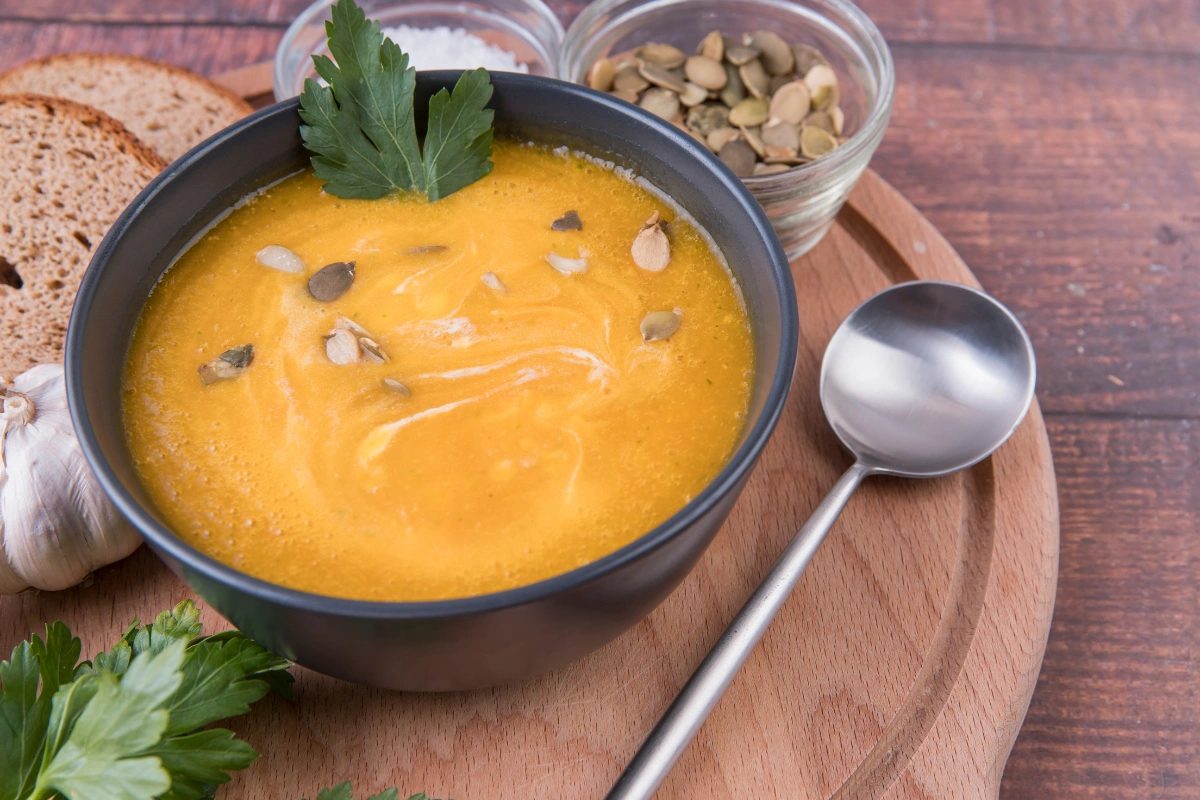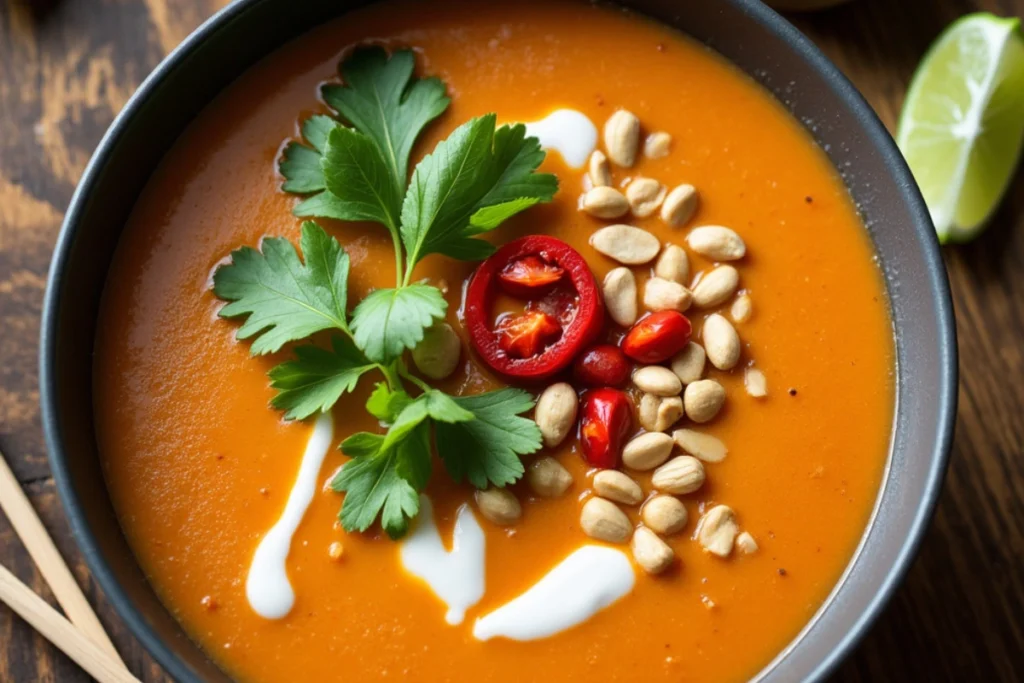Vegan pureed soups are a creamy, comforting, and nutritious option for quick meals or elegant dinners. Whether you’re a seasoned vegan or someone exploring plant-based recipes, pureed soups offer endless possibilities. For inspiration, you can find creative ideas in vegan soup recipes that highlight the versatility of plant-based ingredients. This guide focuses on vegan pureed soup recipes with a peanut twist, showcasing their nutritional value, versatility, and ease of preparation, much like other recipes found in vegan crockpot recipes.
Why Choose Vegan Pureed Soup Recipes?
Vegan pureed soups are not just delicious; they’re also packed with nutrients. These soups are high in fiber, vitamins, and minerals thanks to the use of fresh vegetables and legumes. Their versatility allows them to be customized for various dietary needs, including gluten-free or nut-free options. For more creative soup ideas, reference vegan soup recipes that adapt to multiple preferences.
The creamy texture of vegan pureed soups is achieved without dairy, making them a healthy choice for everyone. Peanuts add a unique flavor and nutritional boost to these soups. They are rich in protein, healthy fats, and essential antioxidants, which contribute to heart health and sustained energy levels. Similar to other protein-rich dishes, like those found in vegan protein-packed meals, peanuts play a central role in creating satisfying meals. The creamy and slightly nutty flavor of peanuts pairs beautifully with vegetables like sweet potatoes and carrots, resulting in a balanced, satisfying dish.
Peanuts provide plant-based protein and are an excellent source of healthy fats, including monounsaturated and polyunsaturated fats. These nutrients help reduce bad cholesterol levels and promote heart health. Peanuts are also high in antioxidants like resveratrol and vitamin E, which support overall wellness. More information on the nutritional value of peanuts can be found in Healthline’s peanut nutrition guide. The creamy and rich texture of peanuts enhances the soup’s flavor without overwhelming the palate. Whether you use peanut butter, crushed peanuts, or peanut flour, this ingredient adds a depth of flavor that elevates the dish.
Key Ingredients for Vegan Peanut Pureed Soups
Creating a delicious vegan peanut pureed soup starts with high-quality, plant-based ingredients that add flavor, creaminess, and nutrition. These soups are simple to prepare, and the right combination of ingredients ensures they turn out perfectly every time. High-quality plant-based components, as highlighted in vegan ingredient swaps, enhance the flavor and nutritional value of these recipes.
Essential Components of Vegan Soups
Base Ingredients
Aromatics like onions, garlic, and ginger create a flavorful base for any vegan pureed soup. Vegetable broth enhances the depth of flavor, while plant-based milk, such as almond, oat, or soy, improves the soup’s creamy consistency without overpowering its taste.
The Role of Peanuts
Peanuts shine as the star ingredient in these soups. They can be incorporated as peanut butter, crushed peanuts, or peanut flour, each offering a unique flavor and texture. Peanut butter, in particular, creates a smooth consistency and a nutty richness that complements other ingredients seamlessly. Their versatility, as shown in recipes like vegan soup variations, makes peanuts an excellent choice for both savory and slightly sweet soup creations.
Adding Vegetables for Texture and Flavor
Sweet Potatoes
Sweet potatoes enhance peanut-based soups with their natural sweetness and creamy texture. They also offer essential nutrients like vitamin A and fiber, making them both flavorful and nutritious.
Carrots
Carrots contribute an earthy flavor and natural sweetness that balances the peanuts’ richness. Packed with beta-carotene and antioxidants, they improve the soup’s taste and health benefits.
Spinach or Kale
Adding spinach or kale provides a vibrant color and nutrients such as iron and calcium. Stir these greens in toward the end of cooking to preserve their bright color and fresh flavor.
Spices and Seasonings
Spices play a crucial role in elevating the flavor profile of vegan peanut pureed soups. Cumin, turmeric, smoked paprika, and chili flakes add warmth and complexity, while lime juice or apple cider vinegar gives the soup a zesty finish. Combining these seasonings in the right balance creates a rich, layered flavor that excites the palate.
Step-by-Step Vegan Pureed Peanut Soup Recipe
Ingredients
- 2 tablespoons of olive oil or vegetable oil
- 1 medium onion, finely chopped
- 3 garlic cloves, minced
- 1-inch piece of fresh ginger, grated
- 4 cups of vegetable broth
- 1 cup of unsweetened plant-based milk (almond, oat, or soy)
- 3 medium sweet potatoes, peeled and diced
- 2 medium carrots, sliced
- ½ cup of natural peanut butter
- 1 teaspoon of ground cumin
- 1 teaspoon of smoked paprika
- ½ teaspoon of turmeric powder
- ½ teaspoon of chili flakes (optional)
- Juice of 1 lime
- Salt and black pepper to taste
- Fresh cilantro or parsley for garnish (optional)
Cooking Instructions
- Sauté the Aromatics: First, heat the olive oil in a large pot over medium heat. Next, add the chopped onion and cook it until it becomes translucent, which takes about 5 minutes. Then, stir in the minced garlic and grated ginger, allowing them to cook for another minute until fragrant.
- Add Vegetables and Spices: After that, add the diced sweet potatoes and sliced carrots to the pot. Sprinkle the cumin, smoked paprika, turmeric, and chili flakes (if using) over the vegetables. Stir thoroughly to coat them evenly with the spices.
- Simmer the Soup: At this point, pour the vegetable broth into the pot and bring it to a boil. Reduce the heat to low, cover the pot, and let the soup simmer for 20–25 minutes, or until the sweet potatoes and carrots soften completely.
- Incorporate the Peanut Butter: Once the vegetables are tender, stir the peanut butter into the soup. Be sure to mix it until it dissolves fully, creating a creamy texture and enhancing the nutty flavor.
- Blend the Soup: After removing the pot from the heat, allow the soup to cool slightly. Then, use an immersion blender to puree the soup directly in the pot until smooth. Alternatively, transfer the soup in batches to a countertop blender, blending until it reaches a creamy consistency.
- Adjust the Consistency and Flavor: Return the soup to the stove if needed. Gradually stir in the plant-based milk to adjust the consistency to your liking. Next, add the lime juice, then taste the soup and season with salt and black pepper as necessary.
- Serve and Garnish: Finally, ladle the soup into bowls and garnish with fresh cilantro or parsley. For an extra touch, sprinkle crushed peanuts on top to add texture and visual appeal.
Nutritional Information (Per 100g)
| Nutrient | Amount |
|---|---|
| Calories | 85 kcal |
| Protein | 3 g |
| Fat | 5 g |
| Carbohydrates | 8 g |
| Fiber | 2 g |
| Sodium | 180 mg |
Variations of Vegan Peanut Pureed Soups
Vegan peanut pureed soups are incredibly versatile, offering endless opportunities to create exciting flavors and textures. By adjusting a few ingredients or incorporating new ones, you can customize your soup to suit different tastes and seasons.
Spicy Thai Peanut Soup
For a bold and spicy twist, transform your classic peanut soup into a Thai-inspired dish by adding red curry paste, which infuses the soup with vibrant heat and rich flavors. Coconut milk enhances creaminess and provides a subtle sweetness that balances the spice. Fresh lime juice and chopped cilantro add a refreshing, zesty touch to complete the dish. Recipes incorporating similar bold flavors, such as vegan soup variations, highlight how small adjustments can elevate texture and flavor. Sprinkling chopped peanuts on top further enhances the texture and nutty profile of the soup.
African-Inspired Peanut Soup

This variation draws inspiration from West African cuisine, which often features peanuts in hearty, savory dishes. Begin by incorporating sweet potatoes and tomatoes into the base, and then add a touch of chili powder to create a slightly spicy kick. The creamy peanut butter combined with earthy root vegetables produces a robust and comforting flavor. For a final garnish, sprinkle fresh parsley or sliced green onions on top.
Peanut and Pumpkin Puree Soup

If you’re looking for a seasonal twist, blend roasted pumpkin with peanut butter to create a fall-inspired version. The natural sweetness of pumpkin pairs beautifully with the nuttiness of peanuts, while warming spices like cinnamon and nutmeg add a cozy aroma. As a finishing touch, drizzle a swirl of coconut cream and sprinkle roasted pumpkin seeds for extra flavor and visual appeal.
Peanut and Carrot Ginger Soup
For a variation with a spicy yet sweet kick, combine carrots and freshly grated ginger with peanuts. Start by sautéing the ginger along with the carrots to infuse the soup with aromatic warmth. Once blended, this version offers a delightful balance of sweetness and spice, making it perfect for colder days.
Peanut and Vegetable Medley Soup
For a textured twist, include a medley of vegetables such as zucchini, bell peppers, and spinach in the soup. Blending part of the soup creates creaminess while leaving some chunks of vegetables adds an appealing bite. This variation is both nutrient-dense and visually vibrant, making it an excellent option for a wholesome family meal. Similar combinations of vegetables are featured in plant-based recipes that emphasize balanced nutrition and flavorful textures.
Tips for Making the Best Vegan Pureed Soups
Creating the perfect vegan peanut pureed soup requires attention to detail and a few essential techniques. These tips ensure your soup is not only flavorful but also achieves the ideal creamy consistency.
Techniques for Creamy Soups
To achieve a silky texture, use a high-speed blender or an immersion blender. A high-speed blender ensures the soup becomes smooth and free of chunks. For a thicker consistency, reduce the amount of vegetable broth slightly and blend for a longer duration. Warming the plant-based milk before adding it to the soup helps maintain the overall temperature and enhances the blending process. Techniques like these, as seen in vegan cooking tips, optimize the texture and flavor of plant-based soups.
Balancing flavors is equally important. To ensure the soup tastes well-rounded, balance the saltiness of peanut butter with a touch of acidity from lime juice or apple cider vinegar. Adding a pinch of sugar or a natural sweetener like maple syrup can also help balance the savory and nutty flavors.
Storage and Freezing Tips
Vegan peanut pureed soups are great for meal prepping because they store well. Allow the soup to cool completely before transferring it to airtight containers. For refrigeration, the soup can last up to four days. For freezing, use freezer-safe containers or bags, leaving some space for expansion. Soups stored in the freezer can stay fresh for up to three months.
When reheating refrigerated soup, warm it over low heat while stirring occasionally to prevent it from sticking to the pot. Add a splash of plant-based milk or vegetable broth to restore its creamy consistency. For frozen soup, thaw it in the refrigerator overnight before reheating it on the stovetop.
Frequently Asked Questions About Vegan Pureed Soup Recipes
Can I make these soups nut-free?
Yes, you can create nut-free variations of vegan pureed soups by replacing peanut butter with sunflower seed butter or tahini. These alternatives offer similar creaminess and flavor without nuts. Additionally, ensure the broth and other ingredients are nut-free to accommodate allergies.
What’s the best plant-based milk for pureed soups?
The best plant-based milk depends on your taste preference and the desired texture. Almond milk is light and neutral, while oat milk adds a creamier texture. For a richer flavor, coconut milk works beautifully, especially in Thai-inspired soups. Unsweetened varieties are recommended to maintain a savory flavor profile.
How long can pureed soups be stored in the fridge?
Pureed soups can be stored in the refrigerator for up to four days. Always use an airtight container to preserve freshness and prevent absorbing other flavors from the fridge. For longer storage, freezing the soup is an excellent option.
Can I substitute peanut butter with another ingredient?
Yes, peanut butter can be substituted with almond butter, cashew butter, or sunflower seed butter, depending on your preference. Tahini also works well, especially if you’re looking for a slightly earthy and nutty flavor.
What’s the best way to thicken vegan pureed soups?
To thicken vegan pureed soups, you can reduce the amount of liquid during cooking or blend in additional starchy vegetables like sweet potatoes, carrots, or pumpkin. Alternatively, stirring in a spoonful of coconut cream or a small amount of cornstarch slurry can help achieve a thicker consistency.
Can I use roasted peanuts instead of peanut butter?
Absolutely! Roasted peanuts can be blended directly into the soup for a fresh, nutty flavor. However, ensure they are unsalted to maintain control over the soup’s seasoning. Roasting the peanuts before blending enhances the flavor even further.
Conclusion
Vegan peanut pureed soups combine comfort, nutrition, and flavor into a single bowl. By focusing on plant-based ingredients like fresh vegetables, creamy peanut butter, and aromatic spices, these soups are versatile enough to suit a variety of dietary preferences and occasions. From classic recipes to creative variations like spicy Thai-inspired soup or African-style peanut stew, the possibilities are endless, as seen in vegan soup ideas.
These soups are not only delicious but also nutrient-dense. Peanuts provide healthy fats, protein, and antioxidants, while vegetables add fiber, vitamins, and minerals. With their creamy texture and bold flavors, vegan peanut pureed soups are perfect for cozy dinners, meal prepping, or sharing with loved ones. Similar plant-based comfort meals, such as those found in vegan comfort food recipes, also emphasize balance and satisfaction.
By incorporating the tips for preparation, storage, and customization, you can ensure your soup turns out perfect every time. Whether served as a main course or a starter, these soups are sure to impress with their heartwarming flavors and versatility.

